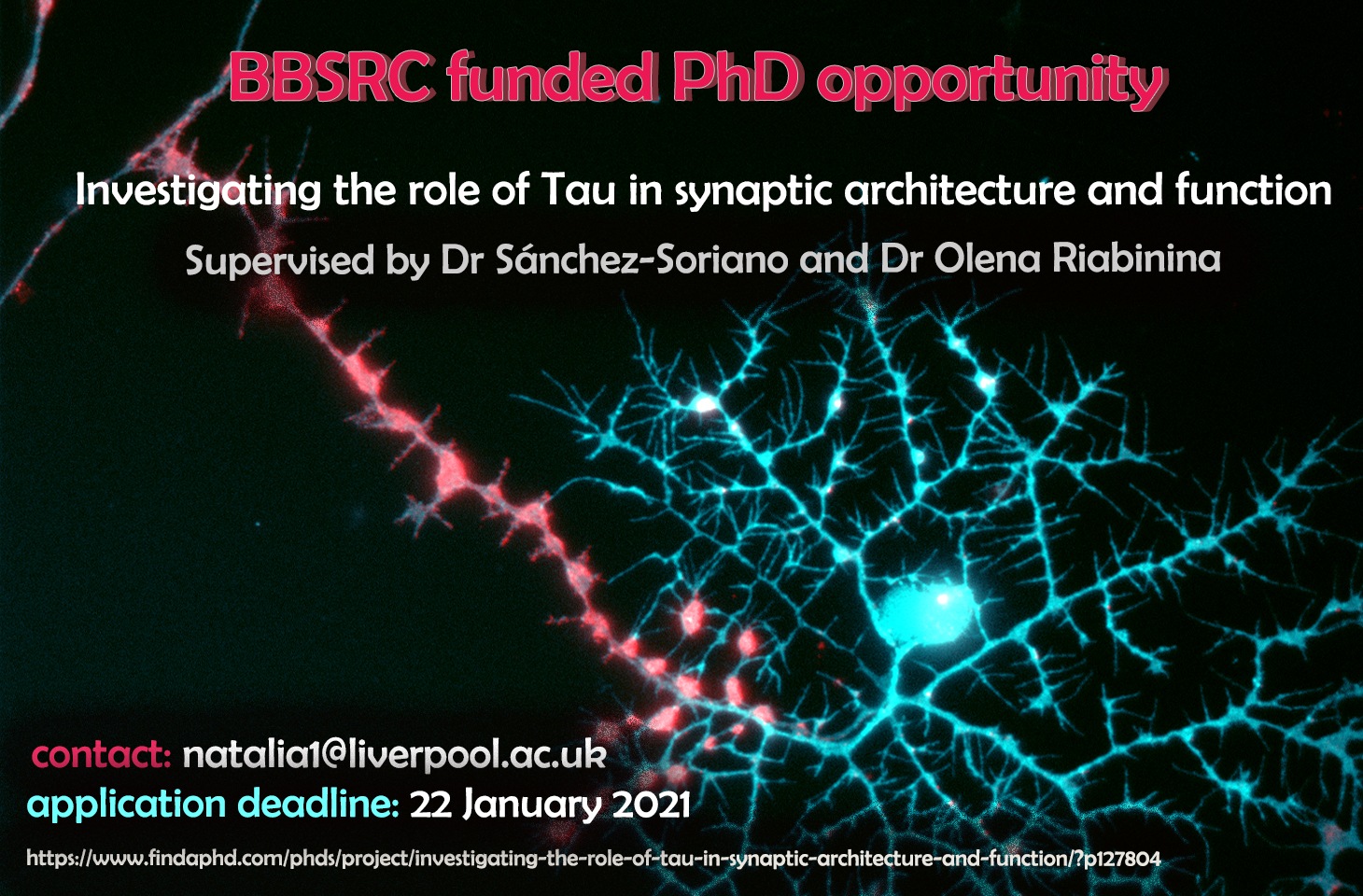PhD opportunity to investigate the role of Tau in synaptic architecture and function
Posted by Natalia Sanchez-Soriano, on 6 January 2021
Closing Date: 15 March 2021

We live in an ageing society with high incidence of cognitive, sensory and motor decline, as well as neurodegenerative diseases such as Alzheimer’s disease (AD) or Fronto-temporal Dementia (FTD). Although decay of synaptic functions is a clear hallmark of the aforementioned conditions, we know too little about the underlying causes. The overarching aim of this project is to study roles of the ageing- and neurodegenerative disease-related factor Tau during the regulation of synapses in health, ageing and disease.
Synapses are specialised neuronal cell junctions which contain complex machinery for rapid transmission of signals to partner cells. This machinery is frequently disrupted during ageing and in neurodegeneration and the resulting synaptic malfunction is an important cause for cognitive, sensory and motor decline. The underpinning mechanisms are poorly understood. To bridge this knowledge gap, we focus on Tau. Tau plays a vital role in the pathogenesis of neurodegenerative disorders and is also linked to physiological ageing. Accordingly, Tau is an important therapeutic target for the development of treatments of AD and FTD.
Considering Tau’s crucial roles during pathogenesis and treatment of dementia, it is vital to understand its physiological function. Tau loss is known to lead to age-related synaptic deficits both in mice and the fruit fly Drosophila, and our work has started to deliver first explanations. Thus, we have shown that Tau loss triggers aberrations of microtubule networks and axonal transport deficits affecting synapse formation and maintenance (Voelzmann et al., 2016, eLife 5, e14694ff.; Hahn et al., 2020, bioRxiv 2020.08.19.257808ff.). We now find from our proteomic and preliminary functional studies that Tau plays even more direct roles by binding to factors that are important for synaptic function. The aim of this project is to understand these synaptic mechanisms of Tau. For this, we will use the model organism Drosophila which harbours Tau and synaptic machinery that is well conserved with humans, but can be studied far more effectively than in other model organisms. Using Drosophila‘s efficient genetics, powerful experimental strategies and simple robust behavioural assays, you will study the functional links between Tau and its synaptic binding partners. This will involve inter-disciplinary approaches using genetics, molecular biology, biochemistry, cell biology, cell culture and in vivo studies, cutting-edge bioimaging of synaptic activity and behavioural studies. You will unravel mechanisms of Tau at synapses as a means to understand neuronal decay during ageing and in neurodegeneration.
Applications from candidates, ideally with some background in cell biology, genetics, neuroscience and/or biomedical sciences are encouraged to apply. The successful applicant will be based in the Institute of Systems, Molecular & Integrative Biology, University of Liverpool, supervised by Dr Sánchez-Soriano (https://sanchezlab.wordpress.com/research/), whilst working closely with Dr Olena Riabinina (http://insectneurolab.com/) at the Department of Biosciences, Durham University. Interested applicants should contact Dr Sanchez-Soriano to discuss the project: n.sanchez-soriano@liverpool.ac.uk.
Application deadline: 22 January
For more information on how to apply:
https://www.nld-dtp.org.uk/how-apply


 (No Ratings Yet)
(No Ratings Yet)